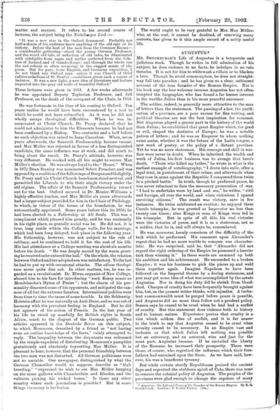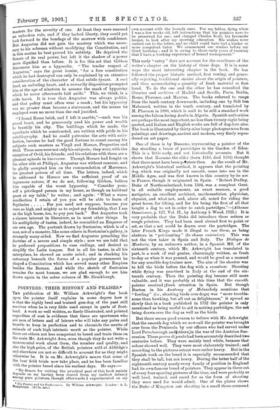AUGUSTUS.•
Mn; SHIICKBIIEGH'S Life of Augustus is a temperate and judicious work. Though he writes in full admiration of his subject, he does violence to no facts, he indulges in no vain theories. It is not for him to whitewash a villain or to blacken a hero. Though he avoid commonplace, he does not straight- way fall into paradox ; and he has given us a clear, unbiassed account of the true founder of the Roman Empire. Nor is his book any the less welcome because Augustus has not often tempted the biographer, who has found a far keener interest in the warlike Julius than in his more peaceful successor.
The soldier, indeed, is generally more attractive to the man of letters than the statesman. The passing of a law, the pacifi- cation of a province, are a poor excuse for fine writing, and political theories are not the best inspiration for romance But Augustus played a graver part in the history of the world than Julius ; he established that great Empire which, for good or evil, shaped the destinies of Europe ; he was a notable patron of letters ; and he was an Emperor to whom nothing came amiss, whether it was the future of the Latin tongue, a new work of poetry, or the policy of a distant province. Yet he was no mere statesman. His courage and skill in war- fare were never in doubt. When he inherited the wealth and work of Julius, his first business was to avenge that hero's death. " Those who killed my father," he wrote in what is the earliest example of autobiography, " I drove into exile, after a legal trial, in punishment of their crime, and afterwards when they rose in arms against the Republic I conquered them twice in a pitched battle." In truth, though he preferred peace, he was never reluctant to face the necessary prosecution of war. " I had to undertake wars by land and sea," he writes, " civil and foreign, all over the world, and when victorious I spared surviving citizens." The result was victory, save in few instances. He twice celebrated an ovation ; he enjoyed three Curule triumphs; he was greeted as Imperator no less than twenty-one times ; nine Kings or sons of Kings were led in his triumphs. But in spite of all this, his real victories were the victories of peace, and it is as a statesman, not as a soldier•, that he is, and will always be, remembered.
He was, moreover, keenly conscious of the difficulty of the task which he performed. His comment upon Alexander's regret that he had no more worlds to conquer was character- istic. He was surprised, said he, that " Alexander did not regard the right ordering of the Empire he possessed a heavier task than winning it." In these words are summed up both his ambition and his achievement. He succeeded to a broken Empire ; it was his business to pick the pieces up and weld them together again. Imagine Napoleon to have been followed on the Imperial throne by a daring statesman, and you may get some idea of what was accomplished by the astute Augustus. Nor in doing his duty did he shrink from blood- shed. Charges of cruelty have been frequently brought against him, but, as the present writer thinks, with injustice. A turbu- lent commonwealth must be purged before peace is possible, and Augustus did no more than follow out a prudent policy. Seneca says he ceased to be cruel when he had had a surfeit of cruelty. But this statement does violence both to history and to human nature. Experience proves that cruelty is a vice which seldom dies of surfeit, and it is far nearer to the truth to say that Augustus ceased to be cruel when severity ceased to be necessary. In an Empire vast and inchoate as that which Julius left nothing was possible but an autocracy, and an autocrat, wise and just for the most part, Augustus became. If he curtailed the liberty of the Romans, he increased their prosperity. There were those, of course, who regretted the influence which their fore- fathers had exercised upon the State. As we have said, how- ever, his was a beneficent tyranny.
But while certain sturdy Republicans praised the ancient days and regretted the stubborn spirit of Cato, there was none to censure the colonial policy of Augustus. The peoples of the provinces were glad enough to change the caprices of many
' Augustus: the Life and Times of the FoRnder of the Roman Empire. By E. S. Shuckburgh. London: T. Fisher Unvcin. [1813,] masters for the severity of one. At least they were ensured an unbroken rule, and if they lacked liberty, they could yet look forward to the bondage of the morrow with confidence. But Augustus did not gain the mastery which was neces- sary to his schemes without modifying the Constitution, and in this matter he best proved his subtlety. He deprived the Senate of its real power, but left it the shadow of a power more dignified than before. It is for this act that Gibbon
denounces him as a hypocrite. The tender respect of Augustus," says the great ironist, "for a free constitution which be had destroyed can only be explained by an attentive consideration of the character of that subtle tyrant. A cool head, an unfeeling heart, and a cowardly disposition prompted him at the age of nineteen to assume the mask of hypocrisy which be never afterwards laid aside." This, we think, is a trifle harsh. It is true that Augustus was always politic, and that policy must often wear a mask ; but his hypocrisy was no greater than became a statesman, and the means he employed were no more than the end justified.
"I found Rome brick, and I left it marble,"—such was his proud boast, and he generously used his power and wealth to beautify his city. The buildings which he made, the aqueducts which he constructed, are written with pride in his autobiography. And he could Patronise the arts with satis- faction, because be had the good fortune to count among his subjects such masters as Virgil and Horace, Propertius and Ovid. These men were not only his subjects ; they were, with the exception of Ovid, his friends; and his relations with them are a pleasant episode in his career. Though Horace had fought on the other side at Philippi, Augustus was without rancour, and he gladly accepted him on the commendation of Maecenas, the greatest patron of all time. The letters, indeed, which he addressed to Horace are the sufficient proof of an ingenuous nature, if we do not, following Gibbon, believe him capable of the worst hypocrisy. " Consider your- self a privileged person in my house, as though an habitual guest at my table," he writes ; and again: " What a warm recollection I retain of you you will be able to learn of Septimius For you need not suppose, because you were so high and mighty as to reject my friendship, that I am on the high horse, too, to pay you back." But Augustus took a sincere interest in literature, as in most other things. In his multiplicity of tastes, indeed, he resembled an Emperor of our own age. The portrait drawn by Suetonius, which is of a man, not of a monster, like some others in Suetonius's gallery, is strangely many-sided. Now we find Augustus preaching the doctrine of a severe and simple style ; now we are told that he preferred prepositions to case endings, and desired to simplify the Latin tongue. But in all his tastes, in all his enterprises, he showed an acute mind ; and in cloaking his autocracy beneath the forms of a popular government he shaped a Constitution which has served many other Empires besides the Roman. And while the sketch of Suetonius remains the most human, we are glad enough to see him drawn again in the sober colours of Mr. Shuckburgh.











































 Previous page
Previous page